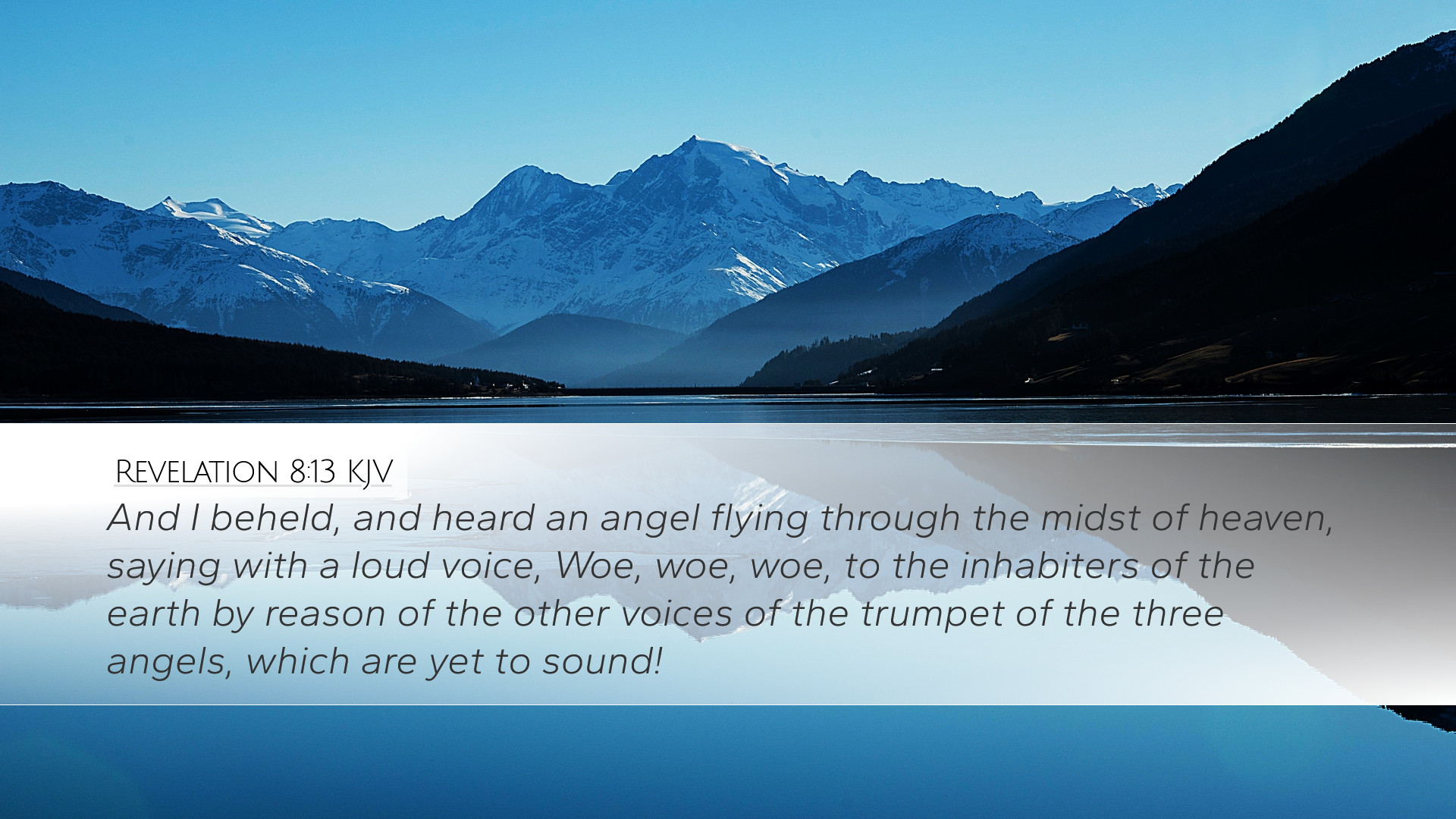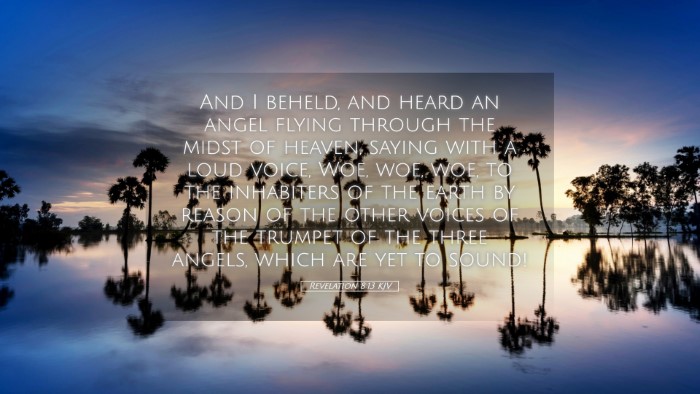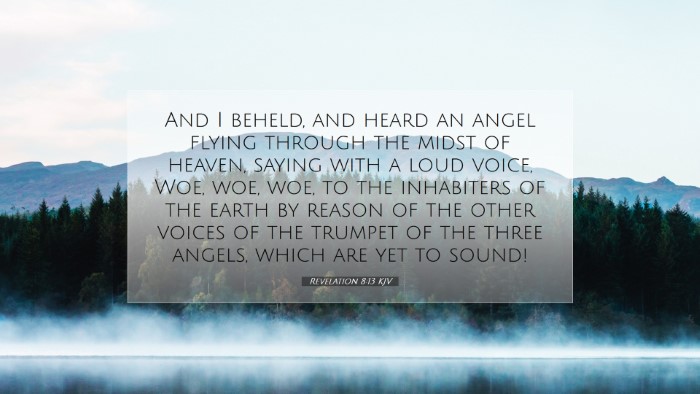Commentary on Revelation 8:13
Verse Text: "And I beheld, and heard an angel flying through the midst of heaven, saying with a loud voice, Woe, woe, woe, to the inhabiters of the earth by reason of the other voices of the trumpet of the three angels, which are yet to sound!"
Introduction
This verse marks a critical juncture in the book of Revelation, as it introduces a series of three woes associated with the final trumpet judgments. The angel's proclamation of woe signifies a foreboding of the impending judgments that will be unleashed upon the earth. Here, we will explore insights from various public domain commentaries to understand the depth and significance of this passage.
Insights from Matthew Henry
Matthew Henry notes that the declaration of "woe" signifies great distress and calamity. His exposition emphasizes the gravity of the message carried by the angel:
- The Role of the Angel: Henry observes that an angel flying through heaven indicates the urgency and divine authority of the message. Angels as messengers are often employed by God to communicate dire warnings.
- Significance of "Woe": The repetition of "woe" three times underscores the intense suffering that is about to befall the earth's inhabitants. Henry suggests that this repetition serves to capture the attention of the reader and evoke a sense of urgency regarding the coming judgments.
- Target of the Warning: The phrase "inhabiters of the earth" points to those who are persistently engaged in sin and rebellion against God. Henry highlights that these woes particularly identify those who have rejected God’s grace.
Insights from Albert Barnes
Albert Barnes provides a thorough analysis of this verse, focusing on the implications of the trumpet judgments:
- The Context of Judgment: Barnes emphasizes the transition from the previous judgments sounded by the first four trumpets, which affected the natural world, to the three woes that will specifically affect humanity. This indicates a progression in severity.
- The Nature of the Woe: He interprets the woe as reflective of more personal and significant suffering, not merely ecological or terrestrial discomfort. These judgments are more directly aimed at the behaviors and attitudes of humankind.
- The Message’s Urgency: Barnes further elucidates that the loud voice of the angel serves to amplify the seriousness of the forthcoming woes. The use of "loud voice" suggests that this is not just a mere declaration but a call to heed the warnings before it is too late.
Insights from Adam Clarke
Adam Clarke provides an exegetical approach that delves into the theological underpinnings of the text:
- The Symbolism of "Flying": Clarke interprets the angel’s flight as symbolizing rapidity and urgency. The angel’s movement through "the midst of heaven" underscores the significance and visibility of the message – it is meant to reach all of creation.
- Understanding "Woe": Clarke analyzes the term "woe" as an expression of grief, warning of impending judgments that carry with them both physical and spiritual ramifications. This impacts not only the body but the soul as well.
- Consequences for the Earth’s Inhabitants: His commentary notes that the woes are not merely passive occurrences but active judgments that serve to bring humanity to repentance. The collective iniquities of the inhabitants of the earth warrant such divine intervention.
Theological Implications
The proclamations found in Revelation 8:13 prompt several important theological discussions:
- The Nature of Divine Judgment: The passage reflects the seriousness with which God takes human sinfulness and the resultant consequences of that sin. The character of God as just and righteous in His judgments is emphasized through the angel's warnings.
- The Urgency of Repentance: The threefold "woe" serves as a clarion call for humanity to heed the warnings of God and turn from their ways. The text beckons readers to reflect on the urgency of repentance and the reality of impending judgment.
- Hope in Warning: Importantly, the very existence of such warnings can be perceived as an act of divine mercy. The call to acknowledge the impending woes provides an opportunity for repentance and reflection upon one’s relationship with God.
Conclusion
Revelation 8:13 captures a moment of profound warning amidst the unfolding of end-time events. The insights provided by Matthew Henry, Albert Barnes, and Adam Clarke encourage readers—be they pastors, students, theologians, or scholars—to ponder both the gravity of God’s judgment and the mercy inherent in His warnings. As we reflect on the implications of this verse, may we be ever mindful of our accountability before God and the necessity of pursuing holiness in anticipation of His return.
Reflection Questions
- How do the warnings in this verse resonate with contemporary issues in our society?
- In what ways can churches embody the call to repentance reflected in the woes proclaimed by the angel?
- What does this verse teach us about the nature of God’s judgment, mercy, and grace?


